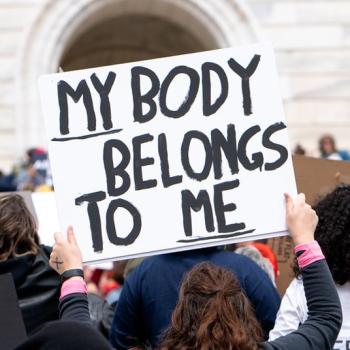Many Christians believe that the founding fathers were inspired by God as they penned our founding documents, and consider (or want) Christianity to be our national religion. Constitutional attorney (and, as mentioned before, atheist) Andrew Seidel argues in his book, The Founding Myth, that our founding documents actually stand in opposition to the idea of a Christian nation.
Continuing our series, let’s examine the commandment on honoring parents – specifically, is this commandment compatible with the freedom that Americans hold dear? (See the rest of the series here.)
(Some denominations correctly call this the 4th Commandment, others – may the veil be lifted from their eyes – consider it the 5th.)
4th Commandment
Here are the words from both the Hebrew (or Old) and the New Testaments:
Honor your father and your mother, that your days may be long upon the land which the Lord your God is giving you (Exodus 20:12).
Children, obey your parents in the Lord, for this is right. “Honor your father and mother,” which is the first commandment with promise: “that it may be well with you and you may live long on the earth” (Ephesians 6:1-3).
Let’s start with the command itself, and then move on to the “promise.” We will also look briefly at the consequences of disobedience to this command.
Can we do better?
The Bible offers a number of stories of good and bad parents and children.
David, for example, spoiled his son Absalom, who became proud and rebellious, and was eventually killed (see 2 Samuel 14-18). Isaac and Rebekkah played favorites with their twin sons, Esau and Jacob (Genesis 25-50), causing immense family conflict. Jacob – renamed “Israel” – “loved Joseph more than any of his other sons” (Genesis 37), which caused more family conflict. Eli was a priest in the temple whose sons were evil, but he did precious little to discipline them; their actions were an embarrassment to the family and the priesthood (1 Samuel). Samuel – who was trained by Eli – also raised rebellious sons (1 Samuel 8).
Andrew Seidel points to Lot, apparently the shining example of godliness in Sodom (Genesis 18-19). Abraham famously haggled with God to save the city from destruction because of “righteous” Lot and his family. God even honored Lot by sending angels to him.
But how honorable was Lot? Well, how honorable is it to give your virgin daughters to be gang-raped for an entire night?
(For this story alone, Christians should call for the banning of the Bible from school libraries.)
To demand that this father be honored – is to dishonor the trauma and criminality that his daughters experienced. It is insensitive, backward, misogynistic, and unjust.
Am I saying that God is insensitive, backward, misogynistic, and unjust? No.
I am saying that when a command appears to be this implausible, it ought to be re-evaluated. If God is just and loves all people equally, we must be interpreting the command incorrectly.
Leaders who insist on devotion to an illogical rule can’t be trusted, and people who follow such rules slavishly (and impose them on their children) are behaving recklessly.
Seidel makes an excellent point about the commandment:
Must [Lot’s] victims honor him?…Because not every parent is worthy of respect, this commandment is, to use a legal term, over-inclusive: it’s a law that protects people it should not. But curiously, it is also under-inclusive, failing to protect people it should.
Since the code already mandates blind respect, it could easily be improved by extending the requirement to honor to all one’s family, or better yet, one’s fellow human beings.
However, if blind respect is to be mandatory, perhaps the best formulation would require that every human deserves the chance to earn respect. One might justifiably end a moral code there and have done better than the Judeo-Christian god.
I have to say, as a lifelong Christian, I agree with the atheist on this one.
How dare a Christian say such a thing? Here’s how: by exercising my free will. By thinking for myself, and realizing that God is more just and merciful than these verses (and others) suggest. These verses were written by humans – males, to be specific – whose agenda becomes evident once you take out the assumption of inerrancy.
They want the tribe to be unquestioningly loyal to the tribe and its leadership. They are willing to scare their people into compliance – and say it came from God, to pack more punch.
This is not anti-Bible or anti-God. This is pro-reason. Not “I think I’m smarter than God,” but more like “if the current interpretation of my holy book makes no sense, maybe the people interpreting it are making incorrect assumptions (like “the Bible is literally inerrant“).
Commercial: if you question “business as usual” in Christianity – or want to question it – subscribe to my newsletter, and we can journey together!)
The penalty for disobedient children
Weirdly, while the Bible encourages good parenting, God does not seem to punish bad parents.
Rather, the full burden of good behavior seems to be on the children. In fact, God seems to punish children for their parents’ sins:
I, the LORD your God, am a jealous God, punishing the children for the sin of the parents to the third and fourth generation…(Exodus 20:5).
If someone has a stubborn and rebellious son who will not obey his father and mother…then his father and his mother shall take hold of him and bring him out to the elders of his town at the gate of that place.
They shall say to the elders of his town, “This son of ours is stubborn and rebellious. He will not obey us. He is a glutton and a drunkard.”
Then all the men of the town shall stone him to death (Deuteronomy 21:18–21).
Proverbs offers a more graphic punishment:
The eye that mocks a father and scorns to obey a mother will be plucked out by the ravens of the valley and eaten by the vultures” (Proverbs 30:17).
Jesus himself reiterated:
Moses said, ‘Honor your father and your mother’; and, ‘Whoever reviles father or mother must surely die” (Mark 7:10).
The “promise” for obedient children
For those who manage to survive childhood without being stoned, there is a reward. Paul reminds them:
Children, obey your parents in the Lord, for this is right. “Honor your father and mother,” which is the first commandment with promise: “that it may be well with you and you may live long on the earth” (Ephesians 6:1-3).
Paul calls it a promise, but the addendum on this commandment is not a promise. I don’t know what you’d call it – a bribe, maybe? We all know children who were well-behaved children who died young, and terrible children who lived long lives.
(For example, one of my best friends from college, a wonderful young woman who loved and honored her folks, was hit by a truck and killed before her 20th birthday. An acquaintance of mine was shot and killed by her twenty-year-old son in a fit of rage. He spent time in prison, but has already lived a much longer life than his mother did.)
Oh, and…
The last part of the addendum to the 4th Commandment, accurately translated as “the land that the LORD your God is giving you,” has with it the baggage of genocide. The land would only belong to the Israelites after they’d ethnically cleansed it.
We will cover this issue under “Thou shalt not kill.”
But before that, watch for a post that takes the 4th Commandment to its natural conclusion. We’ll go beyond parenting and discuss authority figures more generally (including Donald Trump). Stay tuned.
(If you are energized by challenges to the evangelical status quo like this, please subscribe to my newsletter! If you would like to comment on this post, please pop over to my Facebook page. All of my posts are there and open to constructive comment! I welcome your thoughts.)
OTHER POSTS THAT MIGHT INTEREST YOU:













